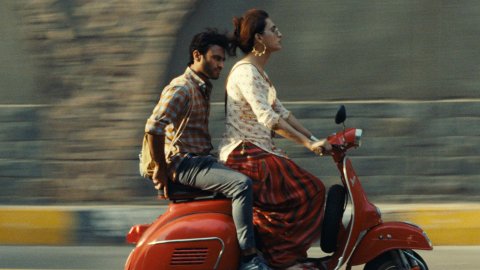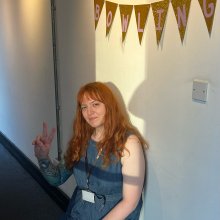
Harriet Taylor Producer, Community Organiser and Writer.
on Tue 7 March 2023Switch Bristol's Harriet Taylor sits down with Director Saim Sadiq to talk Joyland
Posted on Tue 7 March 2023
‘People have said [about Joyland] “it’s the first trans love story,” but this has always existed!..."
The general release of Saim Sadiq’s Joyland in cinemas across the UK has felt like a long time coming. Already reaping accolades from Cannes Film Festival last year – including the distinguished Un Certain Regard Jury Prize, and Queer Palm awards – building on incredible word of mouth from domestic and international audiences who’ve been lucky enough to catch a preview screening, and has been championed fervently by executive producer and Oscar winner Riz Ahmed.
One would be quick to write off some of this as another instance of bloated award season hype, but without a shadow of a doubt, Joyland is a rare occasion of a film deserving such praise. It’s a blend of cinematic showmanship that has the capacity to entertain, inspire and educate in equal measure, but refrains from taking a heavy-handed approach, in part thanks to the singular vision of its director and writer Saim Sadiq. While Joyland was previewing to an audience at Watershed on Feb 9, I had the pleasure to sit down with him and ask more about how the film’s themes, inspiration, and how he managed to handle such complexities with sensitivity and grace.
It is quickly apparent within a short time of meeting that Saim is a particularly gracious person, humbled and perhaps even slightly intimidated by the buzz that surrounds his debut feature - particularly beyond his home country of Pakistan. He is similarly quick to pay dues to his exceptional ensemble cast, which includes among its principle leads Ali Junejo (as Haider, the youngest son in a patriarchal family), Rasti Farooq (as Mumtaz, his wife whose own personal ambitions are cut short amidst the politics of a family hierarchy), and Alina Khan (as Biba, the trans star of the erotic dance theatre who becomes the object of Haider’s – perhaps, misplaced – affections). This triad of talent grounds the film with astonishing realism and commitment to their parts,
"They all came in with so much excitement and interest in figuring these characters out, and added so much that just wasn’t on paper. They worked with me for months before the shoot, just talking, just chatting, not about specific scenes in particular, sometimes just about the way this person’s brain works, what makes them feel a certain way, and what doesn’t. And they really just turned them into fully realised people… really, that’s to their credit." says Sadiq
Elaborating on Junejo,
‘...this is a guy who barely speaks through the whole film – you can count on two hands the amount of lines he has. He’s quiet and isn’t armed with the big dialogue like Biba, or the really dramatic moments like Mumtaz and the sister-in-law. The moments he does get are when he’s performing on the stage. To convey what he’s feeling emotionally without having words as crutches was a credit to him as an actor. To understand him and to display every single dynamic that he has with every character in the film… he’s just an incredible actor. And Alina, of course, equally so.’
Of course, the primary discourse around the film – in the UK and US in particular – has focused significantly more on Khan and the representation of a trans character on screen. For a filmmaker like Sadiq, this can be frustrating. Joyland itself isn’t solely a story of trans experience; it’s the intricate portrait of family, and a love letter to Pakistan. It is a country that has a deeply empathetic culture and history of people existing beyond the gender binary – any resentment towards this community has largely emerged since colonisation.
‘People have said [about Joyland] “it’s the first trans love story,” but this has always existed!’ says Sadiq.
If audiences are willing to scratch below the surface, Joyland is significantly more than a token gesture toward the trans community – it is inclusive in a way that is not obnoxious or patronising. Khan’s presence on screen is not in itself groundbreaking, or rather shouldn’t be, but the way Sadiq indiscriminately places her into the narrative is something many filmmakers could learn from. It exercises compassion for a community of people that are facing difficult times, and are all too exploited in the arts.
An intriguing moment of dialogue in the film references German documentary filmmakers who have recently visited the queer community Biba is a part of. When I mention this, Sadiq laughs and remarks, ‘only a queer person would pick up on that!’ He describes such practices as ‘pornographic’ in nature, a means to exploit for the sole benefit of the filmmaker,
‘I felt like that [line] came out of a certain sense of rage[.] Abject focus and fascination with trauma only – and not the person who’s experiencing this trauma – is a whole genre of film unfortunately.’
Sadiq makes sincere attempts to understand the community he is representing beyond the tunnel vision of trauma, and recalls his experiences researching for the film,
‘I had to explain I wasn’t making a documentary, and that what they shared was completely confidential. So when they started talking, of course, they would be saying this happened and he was shooting this documentary and then he shot us in this particular way, and then we never got to see the film and then we told them not to put this but they still put it in anyway. There’s just this really apparent lack of interest or respect from filmmakers for the [people] that they’re benefitting from. That’s something I think one needs to be cognizant of – don’t give me credit for things I don’t deserve credit for. [And] let’s not prop up filmmakers for making films about marginalised communities any more because the marginalised communities don’t benefit from these films most often. It’s the filmmakers that benefit. Instead of giving them props for that, I think we should give them the responsibility of doing those films better, and honestly, and including the communities that they’re making films about into the conversation before they make the films.’
The sincere attention Sadiq puts into his characters is apparent, not just in Biba, but the whole cast. While the family itself is generally conservative, Sadiq is sympathetic and does not demonise them. There are some particularly tender moments that humanise such characters in unexpected ways, which are coincidentally some of the films most impactful scenes. It’s very easy to paint people as this or that, but Sadiq acknowledges the grey area – the murky boundary which unites people over their similarities. This is especially clear with the unity among the women – Mumtaz, Nucchi, and Fayyaz – living under patriarchal rule. He speaks about his own family experiences, and how that related in the creation of these characters.
‘It’s not like the system is 100% effecting families in the same exact way. But [for] the majority, the patriarchy works in a very cliched and standard way. For men, the father will always perhaps be the scarier one [whereas] with girls, I think it’s the other way around. The relationship with their mother always [has] a lot of love, but there’s always some tension [too.]’
While the female characters of Joyland share solidarity for the oblique rules and obstacles patriarchy presents to them, there are still moments where these bonds are stretched. Nucchi does not defend Mumtaz’s wish to continue work, Fayyaz is ordered around by her son, and most of the women present some sort of prickliness to Biba as a transgender woman. It is an immense pressure that is put on women in Pakistan to be doting and maternal, to an almost performative degree, at the risk of losing their true independent identities in the process.
Sadiq mentions Mumtaz in particular as being ‘completely inspired by [his] mother’, with a few marked differences,
‘My mother was never ambitious; her story is not that she wanted to work and she didn’t get to work. Thankfully, [she is] alive, and happy. But there was something about the resilience that I saw in my mother that was just so inspiring and heartbreaking [that I wanted to capture in Mumtaz.] Inspiring because you really are a big person to be able to give and devote your life to this level of domesticity, and basically to other people – to your children, to your husband, etc. – and yet heartbreaking to think that that’s not how it should be[.] That was a seed that helped me cling on to Mumtaz in a big way.’
But all of the characters are drawn a little bit from Sadiq himself. He speaks of the larger than life Biba, who has a very similar wry sense of humour. ‘I can a bit brash and abrasive and bossy like her,’ he laughs, ‘and I enjoyed pulling those traits into her because it just came so naturally to me while I was writing it. I knew exactly what kind of girl she was, you know?’ There’s a real sense throughout the film that Sadiq has a deep reverence for how he is portraying these characters in particular, and a clear disdain for anyone who lacks the empathy to try to represent the complexities of their respective personalities and feelings. They are not 2D cut-outs, props to accentuate male action – there is depth, of joy, of sorrow, and it is not always pretty, and feminine, and highly presentable, but real.

